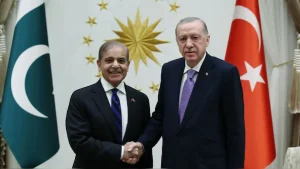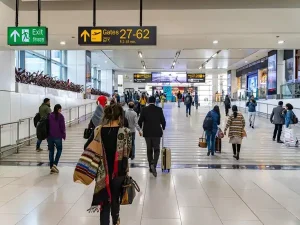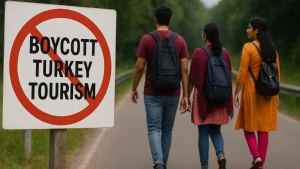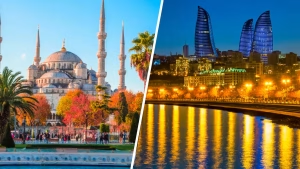New Delhi – In a significant development reflecting the intersection of geopolitics and tourism, Indians boycott travel to Turkey and Azerbaijan in unprecedented numbers following these countries’ public support for Pakistan amid rising tensions with India. Travel agencies have reported a staggering 250% surge in cancellations for trips to these once-popular destinations, highlighting how diplomatic disputes can swiftly impact tourism sectors.
The wave of cancellations began after Turkey and Azerbaijan openly backed Pakistan’s position following Operation Sindoor, which India conducted in response to the April 22 terror attack in Pahalgam that claimed 26 lives. As Indians boycott travel to Turkey, industry experts suggest this could represent a prolonged shift in travel preferences among Indian tourists, who comprised a substantial portion of visitors to these countries.
Azerbaijan and Turkey’s Pro-Pakistan Stance

Azerbaijan released an official statement that closely mirrored Pakistan’s position on the recent conflict, triggering immediate backlash from Indian travelers. Meanwhile, Turkey has taken a more active role by supporting Islamabad’s demand for an international investigation into the Pahalgam attack. Turkey’s history of supplying weapons to Pakistan has further complicated its relationship with India, contributing to the current situation where Indians boycott travel to Turkey in significant numbers.
This diplomatic alignment has proven costly for both nations’ tourism industries, which had previously enjoyed substantial revenue from Indian visitors. As Indians boycott travel to Turkey, travel agencies report redirecting tourists to alternative destinations including Georgia, Serbia, Greece, Thailand, and Vietnam.
Travel Agencies Report Massive Decline in Bookings
MakeMyTrip, one of India’s largest travel platforms, reported a dramatic shift in booking patterns. According to their spokesperson, “Bookings for Azerbaijan and Turkey have decreased by 60% over the last week, while cancellations have surged by 250% during the same period.” This stark figure illustrates how quickly Indians boycott travel to Turkey has become a widespread movement.e


EaseMyTrip’s Chief Executive Officer, Rikant Pittie, confirmed similar trends, noting that his company had witnessed a 22% rise in cancellations for Turkey and 30% for Azerbaijan due to the geopolitical tensions. As Indians boycott travel to Turkey, Pittie observed that travelers were actively seeking alternative destinations, redistributing the substantial tourism spending power of Indian travelers to other countries.
Travel Industry Takes a Stand

The boycott has moved beyond individual travelers to encompass industry-wide action. Travel booking site Ixigo announced on social media platform ‘X’ that it was pausing flight and hotel bookings to Turkey, Azerbaijan, and China, demonstrating how the movement to Indians boycott travel to Turkey has gained institutional support within the travel industry.
EaseMyTrip founder and chairman Nishant Pitti highlighted the economic impact of this shift, noting that 287,000 Indians traveled to Turkey and 243,000 to Azerbaijan last year. “When these nations openly support Pakistan, should we fuel their tourism and their economies?” Pitti questioned publicly, underscoring the economic dimensions of the Indians boycott travel to Turkey movement.
Tourism Associations Endorse the Boycott
The movement has received official backing from major tourism associations. Subhash Goyal, Chairman of the Tourism Committee at the Indian Chamber of Commerce, expressed support for the boycott, stating that the industry stands for ethical and responsible tourism that aligns with national values.
“Several tourism associations and industry bodies have issued statements of solidarity and collective commitment towards prioritizing our national interest over commercial goals,” Goyal explained. As Indians boycott travel to Turkey continues to gain momentum, he emphasized that the Indian Chamber of Commerce joins these organizations in “demanding a boycott of states like Turkey and Azerbaijan, following their stand against India’s response to terrorism.”
Goyal also highlighted the broader principles at stake, noting, “Tourism is a force for good and a driver of peace, global harmony and international understanding.” This statement positions the Indians boycott travel to Turkey movement as not merely a reaction to specific diplomatic disputes but as part of a larger commitment to ethical international engagement.
Economic Impact on Tourism Sectors
The economic consequences of the boycott are significant for both Turkey and Azerbaijan. Turkey, which has invested heavily in developing its tourism infrastructure to attract visitors from emerging markets like India, now faces a substantial reduction in arrivals from one of its growing source markets. As Indians boycott travel to Turkey becomes more widespread, the country could potentially lose millions in tourism revenue.

Azerbaijan, which had been actively promoting itself as an emerging tourism destination for Indian travelers, is similarly affected. The 30% cancellation rate reported by EaseMyTrip represents a significant setback to the country’s tourism development strategy, which had positioned India as a key growth market. The momentum of Indians boycott travel to Turkey and Azerbaijan suggests these losses could compound if diplomatic relations remain strained.
Alternative Destinations Benefit
As Indians boycott travel to Turkey and Azerbaijan gains momentum, alternative destinations are seeing increased interest from Indian travelers. Georgia, Serbia, Greece, Thailand, and Vietnam have all reported upticks in bookings from Indian tourists who have changed their travel plans.
These shifts in tourism patterns demonstrate how geopolitical tensions can reshape travel preferences, with countries perceived as friendly to India benefiting from redirected tourism spending. The Indians boycott travel to Turkey movement illustrates the increasing significance of geopolitical considerations in tourism choices.
Background of Rising Tensions
The current wave of cancellations stems from escalating tensions between India and Pakistan following the April 22 terror attack in Pahalgam that resulted in 26 casualties. In response, India launched Operation Sindoor, conducting targeted strikes on nine locations linked to terrorist activity in Pakistan and Pakistan-administered Kashmir, including camps in Muzaffarabad, Kotli, and Bahawalpur.
This military action intensified the longstanding conflict between the neighboring countries, with international reactions further complicating the diplomatic landscape. As Indians boycott travel to Turkey in response to Turkey’s support for Pakistan, the situation highlights how regional conflicts can have far-reaching effects on seemingly unrelated sectors like tourism.
Final Word
The significant increase in travel cancellations—with a reported 250% surge—clearly indicates that Indians boycott travel to Turkey and Azerbaijan has become a substantial movement with real economic implications. Travel agencies, tourism associations, and individual travelers are collectively responding to these countries’ support for Pakistan following Operation Sindoor.
As the situation continues to develop, the tourism industries in Turkey and Azerbaijan may need to address these concerns diplomatically to regain favor with Indian travelers. Meanwhile, alternative destinations are benefiting from redirected tourism flows, illustrating how quickly global travel patterns can shift in response to geopolitical developments. The movement to Indians boycott travel to Turkey represents a powerful example of how consumer choices can amplify diplomatic positions and reshape international tourism landscapes.

